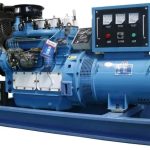Introduction:
Diesel generators have long been a reliable and efficient source of power generation in various applications. One key factor that makes diesel generators stand out is their ability to operate at variable speeds, offering flexibility and improved performance under different load conditions. In this article, we will delve into the world of diesel generators for variable speed operation, exploring their benefits, applications, and key considerations.
1. Overview of Diesel Generators:
Diesel generators are widely used in a range of industries, including construction, mining, healthcare, telecommunications, and more. These generators consist of a diesel engine coupled with an alternator to produce electrical power. The diesel engine drives the alternator, which converts mechanical energy into electrical energy through the process of electromagnetic induction.
2. 500kw diesel generator for emergency backup :

Traditionally, diesel generators operated at a fixed speed to maintain a constant frequency of 50Hz or 60Hz, depending on the region. However, advancements in technology have enabled diesel generators to operate at variable speeds, allowing for greater efficiency and improved performance. Variable speed operation involves adjusting the engine speed based on the load demand, resulting in optimized fuel consumption and reduced emissions.
3. Benefits of Variable Speed Operation:
a. Improved Fuel Efficiency: By operating at variable speeds, diesel generators can match the engine output to the load demand more effectively, resulting in reduced fuel consumption. This leads to cost savings and lower carbon footprint.
b. Reduced Emissions: Variable speed operation allows diesel generators to run at optimal efficiency levels, resulting in lower emissions of pollutants such as nitrogen oxides (NOx) and particulate matter.
c. Enhanced Performance: Variable speed operation enables diesel generators to respond quickly to changes in load demand, providing stable and reliable power output. This is particularly beneficial in applications where load requirements fluctuate frequently.
d. Extended Engine Life: Operating diesel generators at variable speeds can help reduce wear and tear on the engine components, leading to improved longevity and reduced maintenance costs.
e. Flexibility: Variable speed operation gives users the flexibility to adjust the generator's output based on specific requirements, making it suitable for a wide range of applications.
4. Applications of Diesel Generators for Variable Speed Operation:
a. Construction Sites: Diesel generators with variable speed operation are well-suited for construction sites where power requirements can vary depending on the equipment being used. The ability to adjust the engine speed based on load demand ensures reliable power supply at all times.
b. Telecommunications: In the telecommunications industry, diesel generators are used as backup power sources to ensure uninterrupted communication services. Variable speed operation allows these generators to respond quickly to sudden spikes in power demand during peak usage periods.
c. Healthcare Facilities: Hospitals and medical facilities rely on diesel generators for critical power backup in case of grid failures. Variable speed operation ensures a stable power supply to essential equipment such as life support systems and diagnostic machines.
d. Remote Locations: Diesel generators for variable speed operation are ideal for remote locations where grid power is not available or unreliable. These generators can adjust their output based on the varying power needs of the site, providing a dependable source of electricity.
e. Data Centers: Data centers require a reliable power supply to ensure uninterrupted operation of servers and network infrastructure. Diesel generators with variable speed operation offer the flexibility and efficiency needed to support the dynamic power demands of data centers.
5. Key Considerations for Diesel Generators with Variable Speed Operation:
a. Engine Control System: The engine control system plays a crucial role in regulating the speed of the diesel generator based on load conditions. Advanced control systems can optimize fuel efficiency and performance.
b. Maintenance Requirements: While variable speed operation can prolong the engine life, regular maintenance is still essential to ensure the generator operates smoothly and efficiently. Scheduled maintenance checks and servicing should be carried out according to the manufacturer's guidelines.
c. Fuel Quality: High-quality fuel is essential for the reliable operation of diesel generators. Contaminated or poor-quality fuel can lead to engine issues and reduced performance. It is important to use clean and properly filtered fuel to maintain the generator's efficiency.
d. Cooling System: Diesel generators generate heat during operation, and an efficient cooling system is necessary to prevent overheating and ensure optimal performance. Regular inspection and maintenance of the cooling system are crucial to avoid potential issues.
e. Noise and Emissions: While diesel generators are known for their robust performance, noise and emissions can be a concern, especially in urban areas or sensitive environments. Choosing generators with soundproof enclosures and emission control systems can help address these issues.
Conclusion:
Diesel generators with variable speed operation offer numerous benefits, including improved fuel efficiency, reduced emissions, enhanced performance, and flexibility in various applications. By leveraging the advantages of variable speed operation, users can optimize the operation of diesel generators to meet their specific power requirements effectively. As technology continues to advance, diesel generators are expected to play a vital role in supporting critical infrastructure and providing reliable power generation solutions for a wide range of industries.
